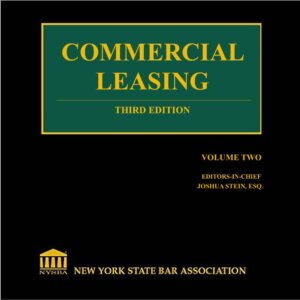

Commercial leases require an effective default clause that allows the landlord to force a tenant to comply with all lease obligations. The default clause commonly provides the procedure for obtaining an eviction or the threat of an eviction for a commercial tenant’s violation of the lease. In addition, many default clauses include provisions requiring payments for unpaid rent or other damages, or for violations of non-monetary requirements in the lease, including, but not limited to, required landlord approvals for alterations and subleasing, or for failure to comply with the law and government regulations. A well-drafted default clause should incentivize a tenant to follow the protocols specified in the lease, knowing that an eviction and damages will result from a default. Because in many parts of the state, some more than others, commercial tenants are able to use the court system to delay and manipulate a landlord and its property, much time and money can be saved by negotiating a powerful and effective default clause—one that will motivate the tenant to comply with all of the terms and procedures of the lease, including the requirement for timely vacating the premises upon the expiration date of the lease. The main objective of any default clause is to give the commercial landlord the legal means either (1) to cause the tenant to cure the breach in an expeditious manner; (2) to swiftly and efficiently obtain a judgment of eviction against a tenant in default of the lease and thus be able to re-let the premises to a new tenant ready and able to pay the rent; or (3) to minimize the landlord’s out of pocket losses from the noncomplying tenant’s breach of the lease. For these reasons, after the rent clause, the default clause is the most important clause in any commercial lease.
However, even the most frequently used “standard form” commercial leases permit a defaulting commercial tenant either (1) to procedurally stall a summary proceeding that would otherwise end in a swift eviction, or (2) to avoid a summary proceeding altogether by seeking equitable relief and applying for a so-called “Yellowstone” Injunction1 or to use dozens of other defenses and tactics to keep the tenant in possession, often without paying rent. Since the authors started practicing law in commercial landlord-tenant court some decades ago, the courts have become less tolerant of tenant tricks, and many judges will follow the strict construction of the lease no matter how poorly written. Simple cases can go on for years of debating or litigating a poorly written default clause. In many cases poorly drafted default clauses frustrate the ability of the landlord to take back the premises and to re-let to a new tenant who would pay rent for the leased space during what, in some cases, can be an unduly lengthy period of litigation. During this period, the tenant in default can take advantage of poorly drafted lease provisions and/or equitable judicial relief to continue in possession without, in some cases, paying any rent or other monies owed under the lease.
Nevertheless, while the consequences of poor drafting can hardly ever be avoided, the parties to a commercial lease may avoid intrusive judicial revision of their lease agreement by negotiating lease terms expressly intended to preclude such judicial activism.2 New York courts have consistently enforced lease provisions that produce harsh results for one party to the lease “no matter how unwise it might appear to a third party.”3 Accordingly, attorneys representing landlords should strive to negotiate lease terms providing (1) that the lease shall be terminated for the chronic nonpayment of rent, (2) that all rents due during the lease term shall be accelerated upon one or more defaults in the payment of rent, (3) that the availability of a cure period, the trigger to seeking a Yellowstone Injunction, either be omitted from the lease entirely or that the lease contain agreed terms to be included in a Yellowstone injunction, should a court be inclined to grant one, such as the amount of the bond to be posted during the Yellowstone period, limitations on discovery, and a requirement for expedited litigation, and (4) that all monies due under the lease, other than the specified rent, shall be deemed “additional rent,” thus also making a default in payment of such “additional rent” subject to a summary nonpayment proceeding.
2023 ADAM LEITMAN BAILEY, P.C.
info@alblawfirm.com | Legal notice | Attorney advertising. Prior results do not guarantee a similar outcome. | 212.825.0365
Copyright © 2023 Adam Leitman Bailey, P.C.